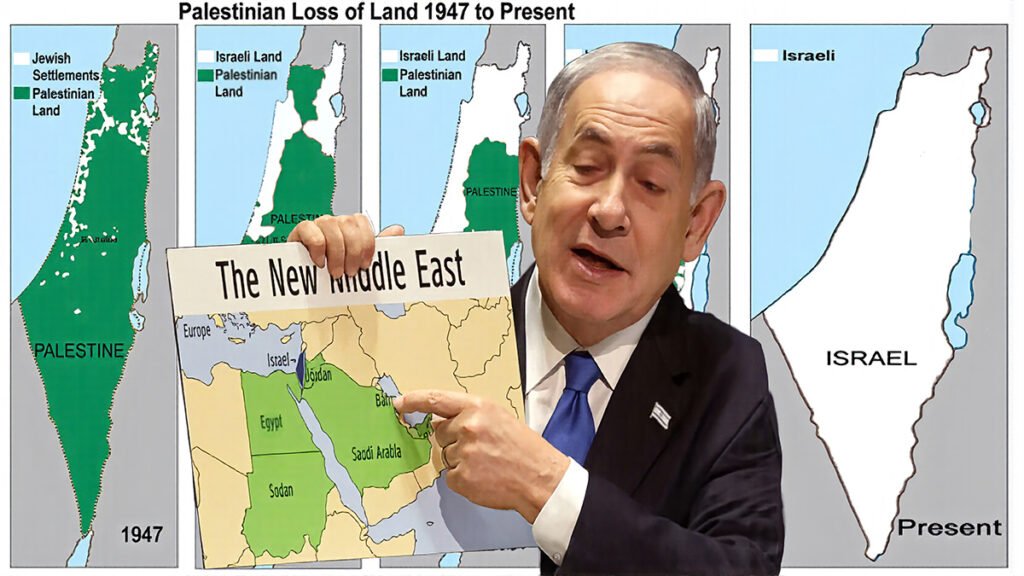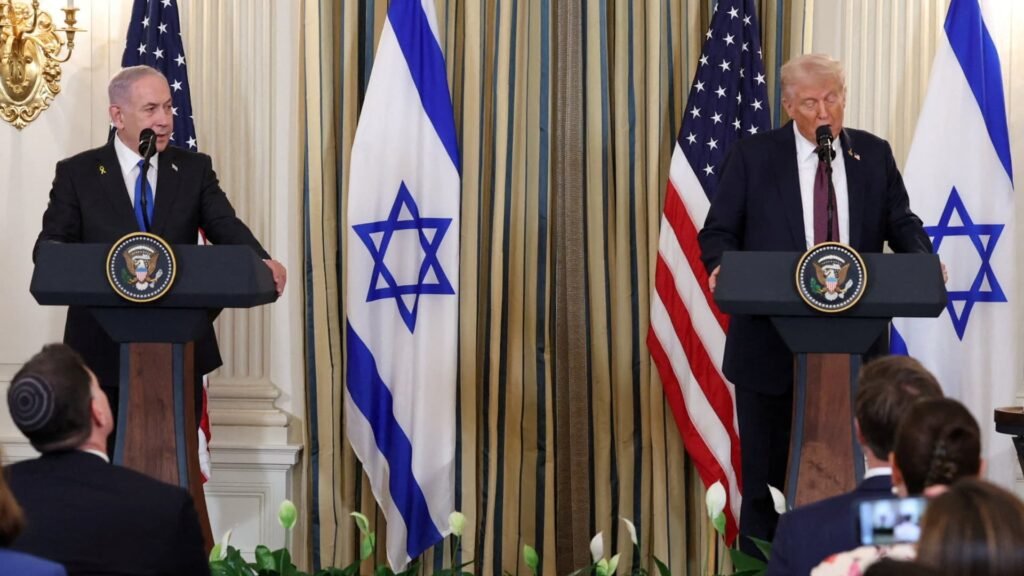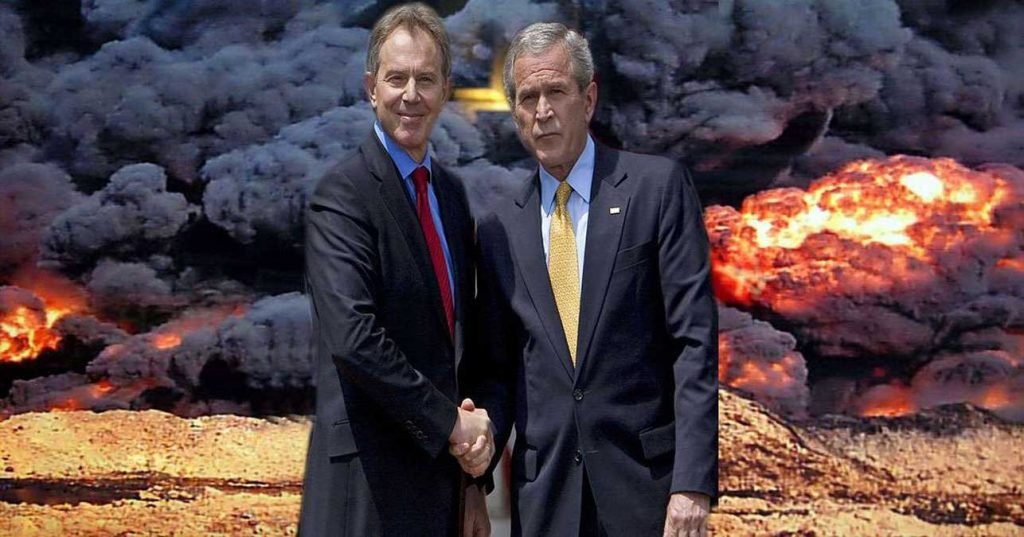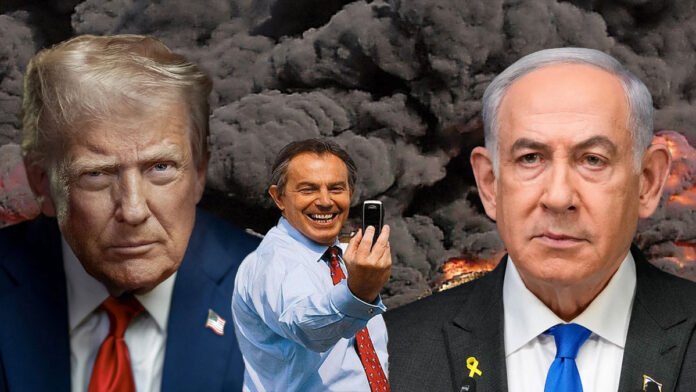The Arsonist of the Middle East: Tony Blair’s Return is an Insult to the Dead
The White House has unveiled its peace plan for Gaza, and in a decision that defies both logic and decency, it includes a prominent role for Tony Blair, the former British Prime Minister whose Middle East legacy consists primarily of rubble, displacement, and hundreds of thousands of dead.
The 20-point plan, released moments before Donald Trump and Benjamin Netanyahu’s joint press conference on Monday, proposes placing Gaza under transitional governance led by Trump and others, including Blair. The US President singled out the former PM for praise, calling him “a good man, very good man” and confirming his place on what Trump dubbed the “Board of Peace.”
The irony is almost too grotesque to contemplate. Tony Blair, the man who championed the illegal invasion of Iraq based on fabricated intelligence, whose “liberal intervention” doctrine left the Middle East in flames, now returns as peacemaker to oversee Gaza’s reconstruction. It’s rather like appointing an arsonist as fire safety officer.
Blair’s Middle East credentials speak for themselves, though not in the way Trump suggests. The Iraq War, which he prosecuted alongside George W. Bush, killed an estimated 150,000 to over one million civilians, depending on methodology. It destabilised an entire region, created the conditions for ISIS’s emergence, and established a template for Western military adventurism that continues to devastate lives today.
His subsequent role as Middle East Peace Envoy for the Quartet (2007-2015) achieved precisely nothing in terms of Palestinian statehood or meaningful conflict resolution, though it did prove lucrative for his various consulting enterprises. That this failure somehow qualifies him to govern Gaza suggests either profound historical amnesia or deliberate provocation.
A Plan for Victory, Not Peace

The plan itself reveals familiar patterns. Gaza will become “a deradicalised terror-free zone” under international oversight, language that assumes collective Palestinian guilt requiring external correction rather than recognising legitimate grievances requiring political resolution. Nobody will be “forced to leave,” it promises, though the destruction of most of Gaza’s infrastructure and housing has already created that displacement through other means.
Here are the main takeaways:
- Gaza will be governed by a temporary technocrat government and Israel will not annex the Strip.
- No one will be forced to leave Gaza. The Strip will be rebuilt.
- If the plan is accepted by both sides, the war will end immediately, with all captives alive and dead returned within 72 hours.
- Israel will release 250 life sentence prisoners and 1,700 Palestinians from Gaza who were detained after October 7, 2023.
- During this time, all military operations will be suspended in preparation for a complete staged withdrawal of Israeli troops.
- Hamas members who commit to peace will receive amnesty while others will be provided safe passage to receiving countries.
- Regional and international forces will provide security and train Palestinian police. Aid will flow into Gaza at agreed levels.
- The US will facilitate dialogue between Palestinians and Israelis for coexistence.
Israel will not “occupy or annexe” Gaza, the plan states, though maintaining a “security perimeter for the foreseeable future” while controlling entry and exit sounds remarkably like occupation by another name. Hamas members who “commit to peace” receive amnesty while others get “safe passage to receiving countries”, effectively demanding the elected government’s dissolution as precondition for ceasefire.
Netanyahu’s enthusiastic endorsement should give pause. He praised Trump’s plan for achieving Israel’s “war aims” including dismantling Hamas’s military and political rule. When the party that has prosecuted this devastating campaign celebrates a peace plan, we must question whether it represents genuine resolution or simply victory terms dressed as diplomacy.
The hostage exchange provisions, all remaining Israeli hostages released within 72 hours, followed by Israel releasing 250 life-sentenced prisoners and 1,700 Gaza detainees, might represent progress if implemented. But Netanyahu’s accompanying threat reveals the underlying dynamic: “If Hamas rejects the proposal, or accepts it and then backtracks, Israel will finish the job by itself. This can be done the easy way, or it can be done the hard way.”
This framing, accept our terms or face annihilation, hardly represents negotiation between parties with equal standing. It’s an ultimatum delivered from position of overwhelming military superiority to a population that has endured months of bombardment, displacement, and deprivation.
Blair’s involvement adds insult to catastrophic injury. For Palestinians who have watched their homes destroyed, their families killed, their territory reduced to rubble, the prospect of reconstruction overseen by the architect of Iraq’s destruction must feel like cosmic mockery. For anyone who believes accountability matters in international affairs, Blair’s rehabilitation as peace envoy represents the final proof that Western political elites face no consequences for their most egregious failures.

The “Board of Peace” itself, an unelected body of international figures making decisions about Palestinian governance, embodies the paternalism that has characterised Western approaches to the region for over a century. Palestinians get no meaningful say in who governs them, under what terms, or toward what ends. Democracy, it seems, is something we practice at home but deny to others when their choices displease us.
Trump’s plan may contain elements that could, under different circumstances and with genuine good faith, contribute to resolution. Immediate ceasefire, hostage release, aid access, and eventual Israeli withdrawal represent necessary components of any sustainable settlement. But when packaged with external governance, forced political restructuring, and threats of military annihilation for non-compliance, these elements become tools of domination rather than foundations for peace.
And overseeing this dubious enterprise: Tony Blair, whose judgment on Middle East matters has been comprehensively discredited by events, whose financial interests in the region raise obvious conflict concerns, and whose presence serves mainly to remind Palestinians that Western powers view them as problems requiring management rather than people deserving self-determination.

The appointment represents either deliberate provocation or staggering tone-deafness. Either way, it demonstrates that those crafting Gaza’s future have learned nothing from the past two decades of catastrophic Western intervention in the Middle East. The same people who broke the region now propose to fix it, using the same assumptions and approaches that created disaster in the first place.
Gaza deserves better than this. Palestinians deserve governance chosen by them, not imposed by the international community’s discredited failures. And any genuine peace process requires acknowledging that security cannot be built on subjugation, that stability requires justice, and that lasting resolution demands treating Palestinians as equal partners rather than problems requiring external solution.
Tony Blair’s involvement guarantees none of these things. His presence serves only to underline that for all the talk of peace, this remains an exercise in managing rather than ending occupation, in restructuring rather than resolving conflict, in imposing order rather than pursuing justice. The scourge of the Middle East returns, and Gaza, already reduced to rubble, now faces reconstruction under the supervision of those whose previous interventions left only devastation in their wake.
The truth always remains… we should all want an end to the bloodshed, the release of hostages, and bring about a rapid humanitarian relief. But a “solution” that substitutes technocrats and trustees for Palestinian self-determination is not peace. It is a replay of the old pattern: military victory, outside management, and the tacit erasure of the political rights that made the conflict political in the first place.
Support Independent Journalism Today
Our unwavering dedication is to provide you with unbiased news, diverse perspectives, and insightful opinions. We're on a mission to ensure that those in positions of power are held accountable for their actions, but we can't do it alone. Labour Heartlands is primarily funded by me, Paul Knaggs, and by the generous contributions of readers like you. Your donations keep us going and help us uphold the principles of independent journalism. Join us in our quest for truth, transparency, and accountability – donate today and be a part of our mission!
Like everyone else, we're facing challenges, and we need your help to stay online and continue providing crucial journalism. Every contribution, no matter how small, goes a long way in helping us thrive. By becoming one of our donors, you become a vital part of our mission to uncover the truth and uphold the values of democracy.
While we maintain our independence from political affiliations, we stand united against corruption, injustice, and the erosion of free speech, truth, and democracy. We believe in the power of accurate information in a democracy, and we consider facts non-negotiable.
Your support, no matter the amount, can make a significant impact. Together, we can make a difference and continue our journey toward a more informed and just society.
Thank you for supporting Labour Heartlands









